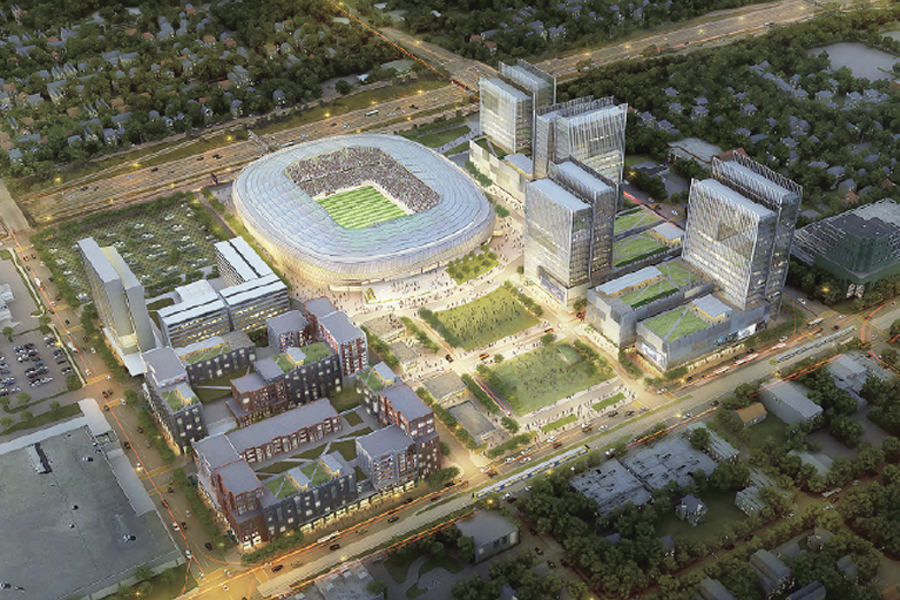Rebecca Noecker, who represents Ward 2 in St. Paul, has introduced a resolution that will be heard at the March 23 City Council meeting. Noecker, who voted in favor of tax breaks for the Minnesota United stadium at the Midway “bus barn” site, says her resolution is worded specifically to oppose any creation of a new city tax incremental financing (TIF) district for the private portion of the 25-acre Midway Center site.
“My concern is making sure that we get a return on investment because we are forfeiting the taxable amount of the stadium, which is going to cost about $150 million,” Noecker told Northern Pitch on Friday. “We are giving up a great deal for a catalyst on the rest of the site. I believe that it will catalyze development or I wouldn’t have voted for it. The Stadium is about 10 acres of the 35 acres, so almost two-thirds is private. It is an important part.”
Noecker explained that her resolution would make sure private businesses pay their own way for the rest of the development in the Midway Center redevelopment. She’s concerned that the public has already spent a good deal of money on the Green Line light rail and the A Line Bus Rapid Transit. “I don’t want us putting in additional public investment that isn’t necessary if we believe that we’ve done enough to catalyze it,” she said.
However, investment in both the BRT and Green Line is much broader than just the Midway area, and the LRT also services Noecker’s downtown ward as well. Councilperson Dai Thao takes exception to Noecker’s resolution. “We have invested a lot of TIF resources in downtown St. Paul [Noecker’s ward]. Over $100 million the last time I looked at it,” said Thao, whose Ward 1 envelopes the Midway redevelopment. “So why are we doing this now when it’s in the Midway? It’s a place that needs jobs and has high concentrations of poverty. It’s more strategic for the city to leave that tool on the table until such a time that we can leverage it for affordable housing, low-income housing or for small businesses, which I call incubator space for up and coming businesses. There are so many things that we can leverage with the use of TIF.”
Noecker admits that the majority of the council is not in agreement and doesn’t think she has enough votes to pass her resolution. More than anything, she says she wants to make a point. “I don’t know that it will pass, and I’m even a bit skeptical that it will,” she said.
Noecker believes she has three votes including her own. She confirmed that Ward 7 councilperson Jane Prince has agreed to vote yes for her resolution. “It sends the message that how many ever of us are against it (TIF district), we are against it,” she said. “If there’s a split vote, at least, a developer goes into the project with a little more of a sense that they may need to pony up more because this isn’t a deep pocket that is unanimously available to them.
“I don’t want to cut off our nose to spite it,” said Noecker. “I’m leaving open the option to use existing pools of TIF money, much as we are doing on the stadium part of the site. My understanding is we have at least a couple of million dollars available from other TIF districts that will be available to use here. I’m also not taking off the table the possibility of creating another TIF district for the public infrastructure – building city streets, sewers or sidewalks on the north part of the site.”
The Ward 2 councilperson says there’s already one blighted structure on the site right now that needs to be removed, and there might also be environmental cleanup involved. “We are sort of past the stadium and now we are looking at phase two, the second part of the site,” she said. “I just want to be really clear from the onset that this is not something developers should be counting on and not something I’m interested in giving them.”
“If we are talking about that amount of square footage that has been predicted –I believe over a million square feet– then we aren’t talking just low-income jobs,” Thao said emphatically. “We are talking about a mixture of high-end jobs, medical jobs, plus the service jobs. Because of the vast amount of potential, that’s on the line here, having her try to limit TIF is far too premature and this point and time.”
“I think in general my colleagues are opposed to this and would prefer to leave more options on the table,” said Noecker. “I’m not accusing my colleagues of being willing to give public subsidies out, willy-nilly. We are all very aware of the fact that we are resource-constrained as a city and we need to be judicious with our public dollars. My colleagues’ concerns are, ‘Why take this option off the table so early?’ That’s why my response is still leaving us a lot of options here, but I’m taking off the one option that I really don’t want to use.”
Noecker finished with an analogy. “If you’re on a diet and you really are on a crave and want to be eating cookies at midnight, don’t leave the cookies in your pantry. I’m just trying to take the cookies out of the pantry and take the one option off the table. I don’t want us getting further down the road and suddenly there is a gap, there is no other way to finance this and there is no other option.”
Thao, who feels the resolution is unfair to a community that has needed assistance for some time, asked those against the resolution contact their city councilperson and voice their opposition to the resolution.

Leave a Reply